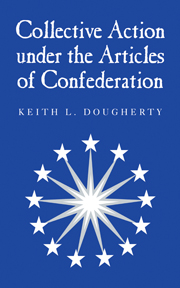Book contents
- Frontmatter
- Contents
- List of Tables and Figures
- Acknowledgments
- 1 The Mystery of State Contribution
- 2 National Interests and State Sovereignty: Objectives of the Confederation
- 3 Collective Action and the Provision of Public Goods
- 4 The History of State Compliance
- 5 State Contributions and Private Interests
- 6 Reacting to Rebellion
- 7 A New Constitution
- 8 Conclusion
- Appendix: Olson's Collective Action Game
- Glossary
- References
- Index
5 - State Contributions and Private Interests
Published online by Cambridge University Press: 15 October 2009
- Frontmatter
- Contents
- List of Tables and Figures
- Acknowledgments
- 1 The Mystery of State Contribution
- 2 National Interests and State Sovereignty: Objectives of the Confederation
- 3 Collective Action and the Provision of Public Goods
- 4 The History of State Compliance
- 5 State Contributions and Private Interests
- 6 Reacting to Rebellion
- 7 A New Constitution
- 8 Conclusion
- Appendix: Olson's Collective Action Game
- Glossary
- References
- Index
Summary
While some States exposed to danger strain every nerve others removed from danger and at ease are remiss and negligent, whereas all should make the proper exertions and furnish their proportions whether immediately or remotely affected and w[hi]ch can alone give energy to military operations.
– Joseph JonesRecall that the model of pure public goods outlined in Chapter 3 predicted that a state would contribute to the national treasury only if it received the most nonexcludable benefits from the public goods produced by Congress. Otherwise, each state would withhold its contribution. A quick look at requisition payments made during the confederation shows that states behaved in a manner that was inconsistent with that model. More states contributed to the national treasury than predicted by the theory of pure public goods. If we presume that states faced strong incentives to withhold their contributions, then some additional factor must explain why the states contributed. I suggest that private goods, produced both consciously and unconsciously by Congress, gave the states the incentive to contribute.
This chapter evaluates the private benefits hypothesis by testing two relationships: (1) the relationship between state contributions and the proximity of the Continental army, and (2) the relationship between state contributions and the amount of public debt held by citizens within each state. Both sets of data include direct measures of private benefits and both suggest that the states were more likely to fill their quotas when they received private benefits than when they did not.
- Type
- Chapter
- Information
- Collective Action under the Articles of Confederation , pp. 84 - 102Publisher: Cambridge University PressPrint publication year: 2000



